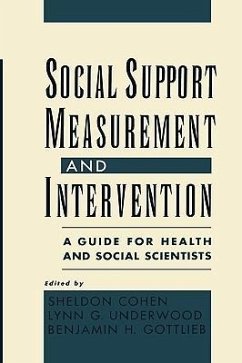Surgery and pharmaceuticals are not the only effective procedures we have to improve our health. The natural human tendency to care for fellow humans, to support them with social networks, has proven to be a powerful treatment as well. As a result, the areas of application for social support intervention have expanded dramatically during the past 20 years. As these areas have expanded, so too has the literature on the theory and measurement of social support. Yet, the literature has focussed on very particular areas. Investigators in the social sciences have mainly focused on the protection that social support confers in the context of stressful life events and transitions, whereas studies in the health sciences have concentrated on the effects of social networks and supports on population mortality and morbidity. Although no single theoretical framework has been widely accepted, there is consensus that both the psychological sense of support and actual expressions of support play critical roles in maintaining health and well being. This book is a state-of-the-art resource for the selection and development of strategies for social support assessment and intervention. Designed for use by behavioral and medical scientists conducting studies of physical illness, psychological adjustment, and psychiatric illness in human populations, this volume presents a broad conceptual framework addressing the role of social support in mental and physical health. The book is divided into four sections. The first provides some historical context as well as a conceptual overview of how social support might influence mental and physical health. The second discusses techniques for measuringsocial networks and support, and the third addresses the design of different types of support interventions. The final section presents some general comments on the volume and its implications for social support research and intervention. This resource is meant to aid res








